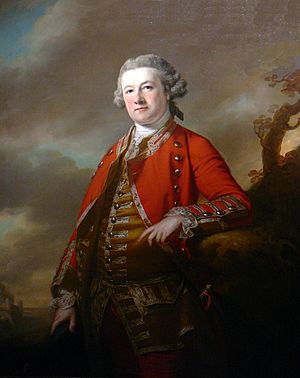Sir Robert Pigot, 2nd Baronet facts for kids

Sir Robert Pigot, 2nd Baronet (born September 20, 1720 – died August 1, 1796) was an important officer in the British Army. He played a role in the American Revolutionary War, a big conflict between Great Britain and its American colonies. A "Baronet" is a special title of honor, like a knight, that can be passed down in a family.
Contents
Early Life and Family
Robert Pigot was born in London, England in 1720. He came from a family with a history of public service. His two brothers also became very important figures:
- George Pigot, 1st Baron Pigot was a governor in Madras, India.
- Admiral Hugh Pigot was in charge of the British fleet in the West Indies.
Their family had Huguenot roots, meaning their ancestors were French Protestants who came to England a long time ago.
His Military Career
Robert Pigot joined the British Army and moved up through the ranks.
- By 1758, he was a major in the 10th Regiment of Foot. A regiment is a large group of soldiers.
- In 1764, he became a lieutenant colonel.
- From 1769 to 1775, he was the commander of the 38th Regiment of Foot.
A Role in Politics
Besides his military duties, Sir Robert Pigot also served in the British government. From 1768 to 1772, he was a member of parliament for a place called Wallingford. This meant he helped make laws for the country. He was also given the job of Warden of the Mint in 1771, a position he held until he died. The Warden of the Mint was in charge of making coins for the country.
Fighting in the American Revolutionary War
Sir Robert Pigot is best known for his role in the American Revolutionary War.
The Battle of Bunker Hill
On June 17, 1775, he commanded the left side of the British attack during the Battle of Bunker Hill. This was one of the earliest and toughest battles of the war. Even though the British won, they suffered many losses. For his bravery in this battle, Pigot was promoted to the permanent rank of colonel on July 9, 1775, in the 55th Regiment of Foot.
Commander in Rhode Island
In 1777, he was promoted again to major general. He was then put in charge of the British forces in Rhode Island. In 1782, he became a lieutenant general.
During the Battle of Rhode Island, General Pigot led about 3,000 British soldiers against 5,000 American soldiers led by General John Sullivan. His leadership helped the British hold their ground.
Family Inheritance
In 1777, when his older brother Lord George Pigot passed away, Robert inherited his brother's special title, the "baronetcy." This also meant he inherited the Patshull Hall estate, a large property. He also received a share of the famous Pigot Diamond, a very large and valuable diamond. This diamond stayed in his family until it was sold in a lottery in 1801.
Sir Robert Pigot retired from his military duties on February 8, 1796, and passed away on August 1, 1796, in Stafford, England.
 | James Van Der Zee |
 | Alma Thomas |
 | Ellis Wilson |
 | Margaret Taylor-Burroughs |

